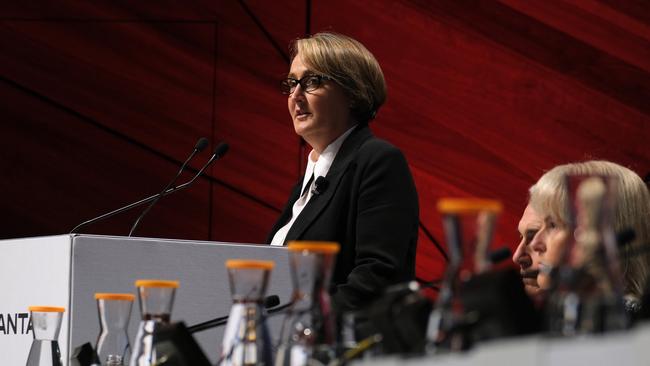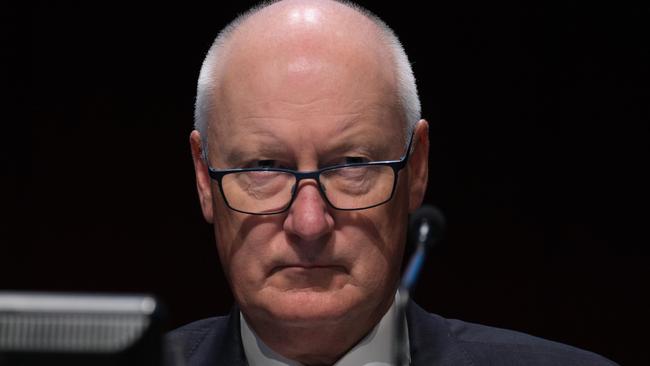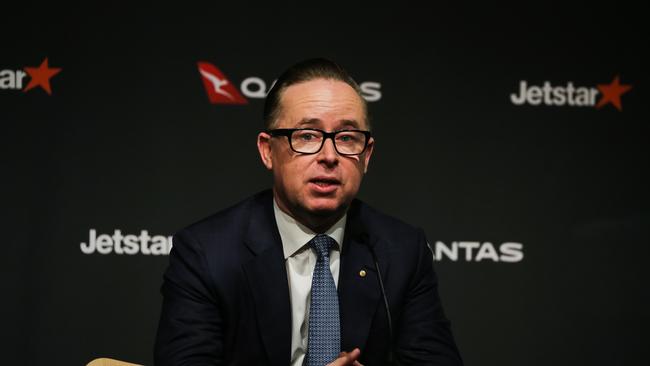Qantas shareholders vote down remuneration report, reject executive pay structure
More than 80 per cent of the votes at the Qantas AGM were against the airline’s remuneration report that saw former chief Alan Joyce farewelled with a $21.4m payout.

Public apologies and a record full-year profit have failed to resonate with Qantas shareholders who delivered a “clear message” of disapproval to the board and executives at the airline’s AGM voting down the remuneration report by a massive margin.
Almost 83 per cent of shareholders voted “no” to the airline’s executive pay structure that saw former CEO Alan Joyce leave with a $21.4m payout. Under Australian corporate law, the vote is considered a “first strike” that could result in a spill of directors, in the event the remuneration report is rejected again at next year’s AGM.
It was expected Qantas would work to ensure that did not happen with chairman Richard Goyder telling the AGM in Melbourne the vote was “a very clear message from shareholders”.
“And it’s matched by our determination to restore confidence and trust,” he said.
Leadership renewal would form part of that process, Mr Goyder said, highlighting recently announced board changes including his own departure next November.
There would also be an independent review of key governance matters to “learn from everything that has happened”. However Mr Goyder insisted the ethics of board members were beyond reproach, even after the illegal outsourcing decision, the sale of tickets on already cancelled flights and the admission Covid travel credits had been “hard” to use.
Questioned about the outstanding balance of travel credits, CEO Vanessa Hudson revealed $520m remained — down from $570m in August.
Mr Goyder denied there was any inkling among board members that the outsourcing of almost 1700 jobs was unlawful, and urged shareholders to read Qantas’ defence in the case brought by the Australian Competition & Consumer Commission. Filed in the Federal Court on Monday, the defence claimed Qantas did not sell “a particular flight” to customers but rather a “bundle of contractual rights”.
In a low point of the AGM, Mr Goyder ordered the microphone given to a retail shareholder be turned off, when the line of questioning became uncomfortable.
Chris Maxworthy was pressing Mr Goyder on why he approved Mr Joyce’s request to sell 2.5 million shares in early June, and suggested the former CEO knew what was ahead for Qantas.
“You’re implying an illegal act. I’m not going to let that stand in this room. Can we close down microphone 2?” said Mr Goyder.
As well as rejecting the remuneration report, shareholders lodged a sizeable protest vote against the re-election of director Todd Sampson. With directors needing at least 50 per cent support to be returned, Mr Sampson managed 66 per cent — well below fellow director Belinda Hutchinson who was reappointed with a 92 per cent vote in favour.
Mr Sampson told the AGM he had reflected extensively on whether to stand for re-election, deciding in the affirmative because of what he could offer the board from his experience in advertising and marketing.
“Our brand and reputation have suffered considerable damage,” he said.
“Of all times in Qantas’ history, especially with a new CEO, this is when my experience will be most valuable.”
It emerged Qantas spent $370,000 on its support of the “yes” campaign in the recent Voice to Parliament referendum which Mr Goyder said the board fully endorsed.
He said the position was in line with previous commitments Qantas had made to constitutional recognition for indigenous people and reconciliation.
“We knew there would be a diverse set of views but we thought it was important to endorse the yes campaign,” Mr Goyder said.
The Australian Council of Superannuation Investors noted the vote against Mr Sampson and overwhelming rejection of the remuneration report, sent “a strong message on accountability”.
“The reputational damage done to the Qantas brand is a case study demonstration of what can go wrong when short-term profit is prioritised over the long-term sustainability and profitability of the company,” said ACSI chief executive Louise Davidson.
“We support the board’s push to reset company culture and governance – and to regain the trust of the Australian public.”
More Coverage










To join the conversation, please log in. Don't have an account? Register
Join the conversation, you are commenting as Logout